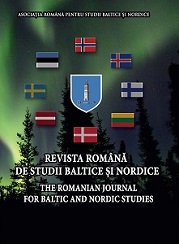Editorial Foreword
Editorial Foreword
Contributor(s): Silviu-Marian Miloiu (Editor)Subject(s): History, Literary Texts, Post-War period (1950 - 1989), Editorial
Published by: Asociatia Romana pentru Studii Baltice si Nordice
Keywords: Baltic; Nordic and Baltic countries; Scandinavian countries; 1918; centenary;
Summary/Abstract: The Romanian Journal for Baltic and Nordic Studies marks its tenth anniversary with a special issue devoted mainly to 100 Years since Modern Independence and Unification in Baltic Sea Region and East-Central Europe, which was the theme of the Ninth Annual International Conference on Baltic and Nordic Studies in Romania held at Valahia University of Târgoviște on November 15-16, 2018. The event focused on the historical, cultural, social and economic processes which led to the independence of Finland, Lithuania, Estonia, Latvia and Poland in the Baltic Sea Region, to the unification of Romania and the independence of Czechoslovakia, Austria, Hungary and Kingdom of Serbs, Croats and Slovenes (Yugoslavia) in East-Central Europe and the consequences of the reshaping of the entire region from the Baltic Sea to the Black Sea and Adriatic Sea. Several other political entities created at the end of World War I such as Ukraine, Georgia or Litbel succumbed after barely living for a few months or years of existence. How did the changes of borders and belonging affect the human communities living in the area and what impact did they have beyond the region on the short, medium and long-run? How were war and peace-making experienced in this region and how did they influence the changes of political geography? How did the processes of independence and unification reverberate throughout the region and how did state and non-state actors reflect, echo and react to this structural transformation of the area? How does this metamorphosis resonate in historical memory, the politics of memory and cultural identity, in historical narratives, including competing narratives, and in the use of history in identity politics a century after the guns were silenced? How does literature permeate the changes occurring at the end of the war to end all wars in the region? How do art, architecture, patrimony, in general, capture the message of those tremendous transformations? Places of commemoration, autobiographies, biographies and memoirs, empiric or theoretical research relevant to the conference topic stood also at the core of the conference.
Journal: Revista Română de Studii Baltice şi Nordice
- Issue Year: 10/2018
- Issue No: 1
- Page Range: 5-6
- Page Count: 2
- Language: English

